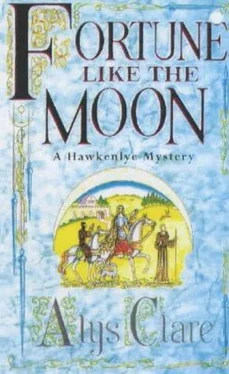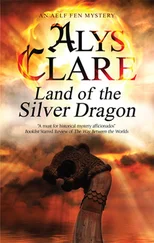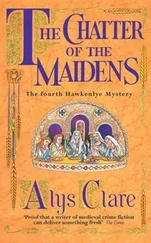Alys Clare - Fortune Like the Moon
Здесь есть возможность читать онлайн «Alys Clare - Fortune Like the Moon» весь текст электронной книги совершенно бесплатно (целиком полную версию без сокращений). В некоторых случаях можно слушать аудио, скачать через торрент в формате fb2 и присутствует краткое содержание. Год выпуска: 0101, Издательство: St. Martin, Жанр: Исторический детектив, на английском языке. Описание произведения, (предисловие) а так же отзывы посетителей доступны на портале библиотеки ЛибКат.
- Название:Fortune Like the Moon
- Автор:
- Издательство:St. Martin
- Жанр:
- Год:0101
- ISBN:нет данных
- Рейтинг книги:3 / 5. Голосов: 1
-
Избранное:Добавить в избранное
- Отзывы:
-
Ваша оценка:
- 60
- 1
- 2
- 3
- 4
- 5
Fortune Like the Moon: краткое содержание, описание и аннотация
Предлагаем к чтению аннотацию, описание, краткое содержание или предисловие (зависит от того, что написал сам автор книги «Fortune Like the Moon»). Если вы не нашли необходимую информацию о книге — напишите в комментариях, мы постараемся отыскать её.
Fortune Like the Moon — читать онлайн бесплатно полную книгу (весь текст) целиком
Ниже представлен текст книги, разбитый по страницам. Система сохранения места последней прочитанной страницы, позволяет с удобством читать онлайн бесплатно книгу «Fortune Like the Moon», без необходимости каждый раз заново искать на чём Вы остановились. Поставьте закладку, и сможете в любой момент перейти на страницу, на которой закончили чтение.
Интервал:
Закладка:
Alys Clare
Fortune Like the Moon
O Fortuna!
velut Luna
Statu variabilis,
semper crescis
aut decresis
Oh, Fortune!
Like the moon, changing,
Forever waxing and waning …
From Carmina Burana, ‘Cantiones profanae’; author’s translation.PRELUDE
Dead, she was a pattern of black, white and red on the sparse, short grass of a dry July.
Black for the fine wool habit, still quite new. It bore none of the darns in the front panel of the skirt that told of years spent kneeling in prayer, and the rear hem was still pristine, not yet worn by careless contact with stone steps. White for the wimple and barbette which had framed the face, although the wimple was no longer secured around the throat and chin but torn away. White, too, for the pale, pale skin. For the face, frozen into the expression of abject terror that it would wear until the flesh rotted from the skull. For the shockingly exposed legs and loins, from which habit and underskirt had been thrown back. In death she was immodest, poor lass, lying there with her thin white legs wide apart. It was as if her corpse had been arranged deliberately so as to make a pleasing pattern, for the outflung arms matched the angle of the spread legs.
Red for the blood.
So much blood.
Her throat had been cut, with the same eye for symmetry that had arranged the limbs. The slash began exactly under the right ear lobe and ended precisely under the left, and it gaped open to its widest immediately beneath the small and somewhat feeble chin.
Her bare neck and throat were soaked with blood, and it had trickled down in several fine streams on to the collar of the habit, where it was absorbed by the wool.
There was blood, too, on the white legs. A great deal of blood, glistening on the dark pubic hair and smeared on the inner thighs.
The morning sun came up over the horizon, and the greyish light of dawn quickly grew stronger, brightening the black and the white so that the contrast deepened. Sunlight shone on the dark crimson blood, making it shine like a jewel. A ruby, perhaps, as dazzling as the one set in the gold cross that lay a few paces from the horror-struck, dead face.
The daylight waxed, and from somewhere quite near a cockerel began to crow, repeatedly, as if determined to be heard. In a nearby building a bell rang, its summons followed by sounds of life as people set about beginning the day.
A new day.
The first of the infinite number that the dead woman would not see.
The First Death
Chapter One
Richard Plantagenet, trying and failing to attend to two things at once, lost his temper, threw a pewter mug half full of ale at a manservant, leapt up out of his chair and, flinging himself forward, stubbed his toe on the protruding end of a stone floor slab.
His furious oath, echoing up to the rafters and down again, had the effect of silencing everyone in the hall, and left even the least observant in no doubt as to the King elect’s frame of mind.
‘Are you all right, sire?’ one of the attending clerics asked bravely.
‘All right? ’ bellowed the King, hopping on one foot as he massaged the toes of the other, ineffectually, he discovered, since he was wearing his boots. ‘No, Absolon, I am not all right.’ He paused, as if summarising the many causes of his discontent, and the reddish eyebrows drew together in a ferocious frown of concentration. Bishop Absolon, fearing the worst, hastily stepped back a pace. But Richard, instead of giving way to his frustration-borne anger, mastered it, returned to his chair, sat down again, and said, in a surprisingly meek tone, ‘Please, Absolon. Continue.’
As the priest launched into the seemingly endless reasons why Richard’s coronation must take place so soon, and why every single tiny detail must be so exhaustively discussed, one or two people standing nearest to the new King noticed that, although he had tucked the communication from England inside his tunic, he had not forgotten about it. The short, strong fingers kept returning to it, blindly finding it and touching it as a man in peril grasps his rosary.
Had any of the clergy surrounding him and badgering him with their suggestions, their requests and their demands known him well, this action of Richard’s would not have surprised them. For the letter was from his mother, and Eleanor of Aquitaine, newly released from her admittedly comfortable imprisonment and truly free for the first time in fifteen years, was in England preparing the way for the coming of her favourite son.
* * *
Neither Eleanor nor Richard, although desiring it most fervently, had expected that Richard would inherit his father’s throne. Who would have, indeed, when he was the second of Henry II and Eleanor’s four surviving sons, with an elder brother who not only thrived but enjoyed the special favour of his father? Indeed, so great was Henry II’s faith in his eldest son that he had the lad crowned while he himself still lived and reigned. Richard, it seemed, must content himself with the duchy of Aquitaine, his inheritance from his mother. No mean gift, certainly. Except the man who ruled Aquitaine would be a duke. Not a king.
But the Young King died. At the age of twenty-eight, full of the characteristic Plantagenet vigour and apparent ruddy health, suddenly he took sick of a fever. A fatal fever.
Henry II, grieving for his heir and his favourite, had to come to terms with the disruption of his careful plans for the secure future of his dynasty. Cursed with feuding offspring and a meddlesome wife who, far from reminding her three belligerent sons of their filial duty, actually encouraged them in their machinations against their father, grudgingly he recognised Richard — the apple of his mother’s eye, damn the man! — as his heir. To the throne of England.
Six years later, Henry II was dead.
The last winter of his life was a dreadful one. He had rid himself of Eleanor and her infernal, everlasting interference by shutting her up in Winchester and putting a guard on her, but he couldn’t mete out the same treatment to his heir, much as he would have wished to; apart from anything else, Richard had an army. He had forged an alliance with Philip II of France, and the two of them had been harrying Henry throughout northern France.
It was enough to make anyone depressed and weary at heart, even a king. Especially a king. Henry’s long winter of hard riding in foul conditions had led to an anal fistula, badly abscessed, and he was resting at Le Mans, trying to build up his strength, when Richard and Philip attacked and forced him to flee the town. Their peace terms were a humiliation for Henry, and grief was added to bitterness when he learned that his youngest son, John, had joined forces with his brother and the French King.
He retired to his castle at Chinon, very sick, and in such pain that he could neither walk nor sit comfortably; they’d had to carry him out to sign the peace treaty. His abscess had opened, and blood poisoning followed quickly. He died on Thursday 6 July, and those who knew no better said it was from a broken heart.
At the height of the hot summer of 1189, then, Richard Plantagenet became King of England. He had been born in England — his much-travelled mother hadn’t let pregnancy slow her down, and she’d given birth to Richard when staying at Oxford — but, since childhood, he had only visited England briefly. He hardly spoke English, and had only a vague notion of what the land and her people were all about. Home, to him, was Aquitaine, and his court was at Poitiers; the very name by which he was usually known in France was Richard the Poitevin.
The paramount need now was not so much to educate Richard on the subject of his new kingdom. It was to educate his new subjects about him. And on the spot was the very person to fulfil the task; energetic — even more than usual, after fifteen years a virtual prisoner — and utterly sincere in her devotion and loyalty to her son, Eleanor, in her sixty-eighth year, set about preparing the way for Richard.
Читать дальшеИнтервал:
Закладка:
Похожие книги на «Fortune Like the Moon»
Представляем Вашему вниманию похожие книги на «Fortune Like the Moon» списком для выбора. Мы отобрали схожую по названию и смыслу литературу в надежде предоставить читателям больше вариантов отыскать новые, интересные, ещё непрочитанные произведения.
Обсуждение, отзывы о книге «Fortune Like the Moon» и просто собственные мнения читателей. Оставьте ваши комментарии, напишите, что Вы думаете о произведении, его смысле или главных героях. Укажите что конкретно понравилось, а что нет, и почему Вы так считаете.












